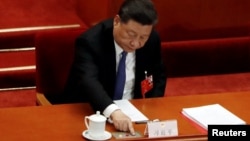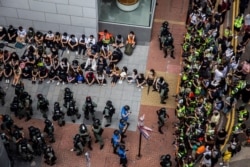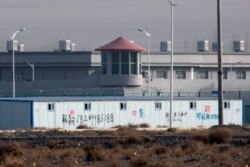China’s national legislature has officially passed a new national security law for Hong Kong. The move increased tensions with the United States and brought more protests in the territory.
In Beijing, the National People’s Congress, or NPC, approved the measure that aims to change Hong Kong’s Basic Law. This law gives Hong Kong limited self-rule. China agreed to the rules when it took over Hong Kong from Britain in 1997.
The new security law requires the territory to enforce measures that will be decided by a top committee of the NPC. The law also permits Chinese intelligence agencies to operate in the city. Chinese Premier Li Keqiang defended the law as being in line with mainland China’s promises.
Hong Kong’s pro-democracy activists protested the move at a shopping area Thursday. A day earlier, police had arrested 360 people as thousands demonstrated in anger over the national security bill proposed by China.
Three pro-democracy lawmakers, however, were removed from Hong Kong’s legislature during a debate Thursday. The local legislature was considering a bill that would criminalize insulting or abusing the Chinese national anthem.
On Wednesday, U.S. Secretary of State Mike Pompeo announced that the United States would no longer treat Hong Kong as autonomous from the government in Beijing. A state department official said Hong Kong could face visa limits and economic measures similar to China.
The move could influence many companies to reconsider Hong Kong as a business center. More than 1,300 U.S. companies have offices in the city, providing about 100,000 jobs.
China has repeatedly said it would take necessary measures against any foreign interference in Hong Kong. On Thursday, Li called for China-U.S. cooperation to promote “common interests” in solving international issues and promoting trade, science and other fields. He said, “Both countries stand to gain from cooperation and lose from confrontation.”
US Congress approves punishments for Chinese officials
The NPC vote comes shortly after the U.S. Congress passed a bill that would place restrictions on Chinese officials linked to the detention of ethnic Uighurs.
The bill had strong support from both the Democratic and Republican parties. All but one member voted for the measure. It now requires President Donald Trump to sign it to become law.
The president said he would “very strongly consider” signing the bill. He has said he is displeased with China’s reaction to the spread of the coronavirus which started in Wuhan, China. The Hong Kong security law is also a point of tension.
The new U.S. bill targets Chinese officials, including the Communist Party official who oversees government policy in Xinjiang. It also requires the U.S. government to report to Congress violations of human rights in Xinjiang and China’s use of technology for detentions and spying.
People held in the internment camps have described being subjected to forced political teachings, torture, beatings and other actions. They say they are not being permitted to observe their religion.
The Chinese government denies that people are being held against their will. It has said the camps are for re-education and job training. China has also refused independent international inspections of the holding centers.
I’m Mario Ritter, Jr.
Mario Ritter Jr. adapted Associated Press and Reuters news reports for this VOA Learning English story. Hai Do was the editor.
________________________________________________________________
Words in This Story
internment –n. the act of putting someone in prison for political reasons or during war







